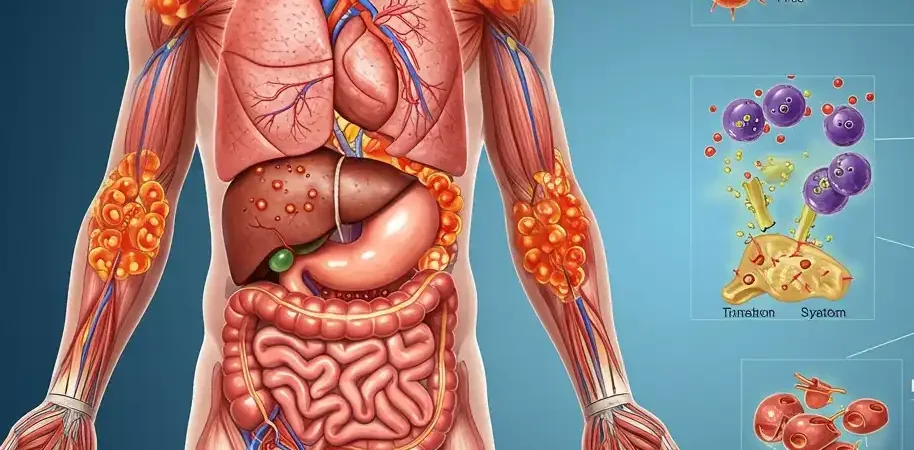Chronic Inflammation and Aging – The Silent Agers
Chronic inflammation is one of the most underappreciated drivers of aging. While inflammation is a natural part of the immune response, chronic inflammation keeps the body in a constant state of alert, damaging healthy cells and tissues. As a result, this persistent state accelerates the aging process, leading to age-related diseases like Alzheimer’s, cardiovascular disease, and even cancer. But what if we could slow it down? In this article, we’ll explore how chronic inflammation speeds up aging and offer science-backed strategies to fight it anti-aging naturally. Understanding this connection can help you take steps to enhance longevity and overall well-being.
How Chronic Inflammation Accelerates Aging

Chronic inflammation impacts virtually every organ system, accelerating what scientists now call “inflammaging” the convergence of inflammation and aging. Importantly, this process disrupts cellular repair, damages DNA, shortens telomeres, and triggers oxidative stress. The consequences are subtle at first, but over time they become significant, often culminating in chronic disease and visibly accelerated aging.
The Science of Inflammaging
Research from the National Institutes of Health shows that chronic inflammation leads to cumulative oxidative damage, reducing cellular lifespan (NIH Source). Consequently, it’s a slow burn that increases susceptibility to age-related illnesses.
In simple terms, inflammaging is your body’s prolonged inflammatory response to stressors such as toxins, poor diet, lack of sleep, and emotional stress. Over time, this state becomes detrimental, as the immune system remains active even when there’s no infection to fight.
Key Mechanisms
- DNA Damage: Constant inflammation creates free radicals that attack DNA, leading to mutations and compromised cellular function.
- Cellular Senescence: Cells stop dividing and release pro-inflammatory cytokines, contributing to a vicious cycle of aging and immune dysfunction.
- Telomere Shortening: Chronic inflammation accelerates telomere degradation, a key marker of biological aging. The shorter your telomeres, the faster your cells age.
- Protein Misfolding: Inflammatory stress interferes with protein synthesis and folding, leading to neurodegeneration and other age-related disorders.
Diseases Linked to Chronic Inflammation
- Cardiovascular disease
- Alzheimer’s disease
- Rheumatoid arthritis
- Type 2 diabetes
- Osteoporosis
- Macular degeneration
Notably, all of these conditions are commonly associated with old age, and chronic inflammation serves as a shared pathway in their progression.
Natural Ways to Reduce Chronic Inflammation and Promote Longevity

To address chronic inflammation, the key lies in lifestyle modifications and anti-inflammatory strategies that support the body’s natural healing processes. Fortunately, nature has provided us with many tools to neutralize inflammation and restore balance to our internal systems. By implementing these methods, not only can you prevent premature aging, but you can also enhance energy, mental clarity, and resilience.
Anti-Inflammatory Diet
Indeed, one of the most powerful tools is your plate. Foods rich in antioxidants, fiber, and omega-3 fatty acids help curb inflammation.
Top Anti-Inflammatory Foods
- Berries: Rich in anthocyanins, which reduce free radical damage.
- Leafy Greens: Spinach, kale, and arugula are packed with anti-inflammatory flavonoids.
- Turmeric: Contains curcumin, a potent anti-inflammatory compound.
- Fatty Fish: Salmon and sardines provide EPA and DHA, essential omega-3s.
- Olive Oil: A monounsaturated fat with antioxidant and anti-inflammatory effects.
Avoid processed foods, sugars, and trans fats. Notably, a Mediterranean-style diet is clinically proven to reduce inflammatory markers (Harvard Health).
Sleep and Inflammation
Significantly, poor sleep increases cytokine production and disrupts circadian rhythms. Aim for 7–9 hours of quality sleep per night to allow your body to repair and regulate inflammatory pathways. Sleep deprivation, especially over extended periods, has been linked to systemic inflammation, contributing to cognitive decline, hormonal imbalance, and metabolic dysfunction.
Tips for better sleep:
- Stick to a consistent schedule
- Avoid screens 1 hour before bedtime
- Create a dark, cool sleeping environment
- Limit caffeine and alcohol intake
Exercise and Movement
Importantly, moderate exercise lowers inflammatory cytokines. High-intensity workouts should be balanced with rest and recovery. The key is consistency 30 minutes a day of walking, yoga, strength training, or swimming can significantly lower inflammatory biomarkers.
Anti-Inflammatory Supplements That Actually Work for Chronic Inflammation

When lifestyle changes like diet, exercise, and stress management aren’t enough to tame chronic inflammation, science-backed supplements can offer crucial support. Chronic inflammation, unlike acute inflammation, silently simmers over time, gradually damaging tissues and organs. It contributes to everything from joint pain and digestive issues to autoimmune diseases and premature aging. That’s why incorporating targeted supplements can be a powerful tool in your anti-inflammatory arsenal especially when guided by clinical evidence.
1. Omega-3 Fatty Acids (Fish Oil)
Importantly, omega-3s are some of the most extensively studied anti-inflammatory nutrients. Found in fatty fish like salmon, sardines, and mackerel, these essential fats help balance the ratio of pro-inflammatory to anti-inflammatory molecules in the body. Clinical trials show that daily fish oil supplementation (typically 1–3 grams) can significantly reduce levels of C-reactive protein (CRP), a key marker of inflammation. Omega-3s also improve heart health, brain function, and joint mobility, making them a holistic ally in fighting aging.
2. Curcumin (Turmeric Extract)
Curcumin is the active compound in turmeric, revered in Ayurvedic and traditional Chinese medicine. Specifically, it inhibits the NF-kB pathway, which is known to control the expression of many pro-inflammatory genes. In its raw form, curcumin has poor bioavailability, but modern formulations using liposomal or piperine-enhanced curcumin significantly improve absorption. Studies suggest curcumin may alleviate symptoms in conditions like rheumatoid arthritis, inflammatory bowel disease, and even depression linked to inflammation.
3. Quercetin
Additionally, quercetin is a potent antioxidant flavonoid found in apples, onions, and capers. It modulates inflammation by downregulating pro-inflammatory cytokines such as TNF-alpha and IL-6. Research has also linked quercetin to immune system support, especially during viral infections. Its natural antihistamine properties make it a great choice for people dealing with allergy-related inflammation too.
4. Boswellia Serrata (Indian Frankincense)
Boswellia has been used for centuries in traditional medicine for inflammatory conditions like arthritis and asthma. Modern research shows it can significantly reduce pain and stiffness in osteoarthritis patients by inhibiting 5-lipoxygenase, an enzyme involved in leukotriene formation chemical mediators of inflammation. It’s also gentler on the stomach than NSAIDs, making it a suitable long-term option.
5. Magnesium
Equally important, magnesium plays a crucial role in over 300 enzymatic reactions in the body and is essential for nerve function, muscle recovery, and sleep. Low magnesium levels have been associated with increased inflammatory markers like CRP. Supplementation with magnesium glycinate or citrate may help calm the nervous system, reduce inflammation, and improve sleep quality three core aspects of anti-aging.
6. Vitamin D3 + K2
Vitamin D3 is not just vital for bone health; it’s also a powerful immunomodulator. Deficiency in D3 has been linked to chronic inflammatory diseases such as multiple sclerosis and type 2 diabetes. When paired with K2, it ensures calcium is properly absorbed and deposited in the bones rather than arteries, preventing calcification and vascular inflammation.
Managing Stress to Reduce Chronic Inflammation and Age Gracefully

In today’s fast-paced world, chronic stress has become a ubiquitous part of life, often overlooked as a major contributor to chronic inflammation and accelerated aging. Understanding how stress affects your body is crucial in learning to manage it effectively. Stress triggers the release of cortisol and other stress hormones, which, when elevated over long periods, create a pro-inflammatory environment that damages tissues, weakens the immune system, and accelerates cellular aging.
How Stress Fuels Chronic Inflammation
When you encounter stress, your body activates the “fight or flight” response, flooding your bloodstream with cortisol and adrenaline. While helpful in short bursts, prolonged exposure to these hormones leads to increased production of pro-inflammatory cytokines proteins that promote inflammation. This chronic inflammatory state not only affects physical health but also impacts brain function, mood, and overall vitality.
According to a study published in Psychoneuroendocrinology, chronic stress is associated with increased levels of interleukin-6 (IL-6), a key inflammatory marker linked to cardiovascular disease and cognitive decline (Source).
Practical Stress-Reduction Techniques
The good news is that many effective, natural strategies exist to reduce stress, lower inflammation, and promote graceful aging.
Mindfulness Meditation
Daily mindfulness meditation even just 10 minutes directly lowers cortisol levels and reduces inflammatory gene expression.
Deep Breathing and Relaxation
Deep breathing exercises activate the parasympathetic nervous system (the body’s “rest and digest” mode), helping to counteract stress-induced inflammation. Techniques such as diaphragmatic breathing, box breathing, or the 4-7-8 method are simple, effective tools to incorporate into daily routines.
Physical Activities: Yoga and Tai Chi
Combining movement, breath, and meditation, practices like yoga and Tai Chi not only reduce stress but also have documented anti-inflammatory effects. Studies report reductions in CRP (C-reactive protein) and other inflammatory markers among practitioners (Source).
Nature Exposure
Spending time outdoors, particularly in green spaces, lowers cortisol levels and reduces systemic inflammation. Known as “forest bathing” or Shinrin-yoku in Japan, this practice is gaining scientific support for its health benefits (Source).
Journaling and Emotional Expression
Writing down thoughts and feelings helps process stress, releasing emotional burdens and decreasing physiological stress responses. Research suggests expressive writing improves immune function and reduces inflammation (Source).
Building a Daily Routine for Lasting Results
Consistency is key. Incorporate a combination of these stress management techniques into your daily schedule to maintain balanced cortisol levels and reduce chronic inflammation. Small, mindful changes like dedicating 10 minutes to meditation, taking brief walks in nature, or practicing deep breathing during work breaks can compound over time to deliver profound health benefits.
Final Thoughts: Heal Inflammation, Slow Aging
The connection between chronic inflammation and aging is undeniable. But the good news is that by making smart lifestyle choices, eating an anti-inflammatory diet, taking the right supplements, and managing stress, you can turn the tide. Ultimately, your body wants to heal you just need to give it the tools. Aging doesn’t have to be a passive process. Moreover, with awareness and action, you can age with vitality and grace.






